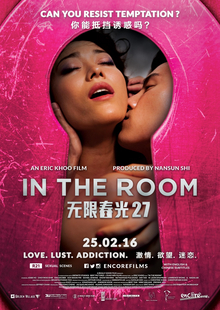
Baise-moi is a 2000 French erotic crime thriller film written and directed by Virginie Despentes and Coralie Trinh Thi and starring Karen Lancaume and Raffaëla Anderson. It is based on the novel by Despentes, first published in 1993. The film received intense media coverage because of its graphic mix of violence and explicit sex scenes. Consequently, it is sometimes considered an example of the "New French Extremity".
The following lists events that happened during 2004 in Singapore.
Censorship in Singapore mainly targets political, racial, religious issues and homosexual content as defined by out-of-bounds markers.

Eric Khoo Kim Hai is a Singaporean film director and producer who is often credited for the revival of the Singapore modern film industry.

The Undesirable Publications Act 1967 (UPA) is a Singapore statute which, according to its long title, prevents the importation, distribution, or reproduction of undesirable publications and for purposes associated in doing so. The Act, which was passed in 1967 empowers the Government of Singapore in incriminating and punishing both individuals and corporates that are involved in the sale, supply, exhibition, or distribution of obscene and objectionable publications.

Joanne Peh Wei Siew is a Singaporean actress and television host. She is married to Singapore-based Chinese actor Qi Yuwu.

Tan Pin Pin is a Singapore-based film director. She is best known for the documentary film Singapore GaGa (2005). It was the first Singaporean documentary to have a theatrical run. In 2014, her documentary To Singapore, With Love (2013) was denied for all ratings by the Media Development Authority, effectively banning it in Singapore.

The Media Development Authority was a statutory board of the Singapore Government, under the Ministry of Communications and Information (MCI).
Internet censorship in Singapore is carried out by the Infocomm Media Development Authority (IMDA). Internet services provided by the three major Internet service providers (ISPs) are subject to regulation by the MDA, which requires blocking of a symbolic number of websites containing "mass impact objectionable" material, including Playboy, YouPorn and Ashley Madison. The civil service, tertiary institutions and Institute of Technical Education has its own jurisdiction to block websites displaying pornography, information about drugs and online piracy.
The Japanese Film Festival (JFF) is a film festival held in Singapore and dedicated to Japanese cinema. It was first held in 1983 and then held annually from 1999 to 2016, and curated with Singapore audiences in mind, led by local programmers with a wide-ranging programme of film classics, Japanese independents and commercial releases. There was no festival in 2017. Under new direction from 2018 from the Japan Foundation in Tokyo, it has shifted its focus to screening mainly commercial releases from Japan.

L.A. Zombie is a 2010 gay zombie porn film written and directed by Bruce LaBruce. It premiered in competition at Locarno International Film Festival in Switzerland in 2010. The film exists in two versions, a 63-minute cut version showcased at various festivals and theatres and a 103-minute directors cut DVD release containing hardcore gay pornography not seen in the cut version.

Pink Dot SG, known endonymously as Pink Dot, is a pride event that has occurred annually since 2009 in support of the LGBTQ community in Singapore. Attendees of Pink Dot events gather to form a "pink dot" to show support for inclusiveness, diversity and the freedom to love in the country. Pink Dot events typically include concert performances and booths sponsored by organizations that support the LGBT community and cause in addition to the event's name-brand formation.

Ken Kwek is a Singaporean screenwriter, director, playwright and author. His short film compendium, Sex.Violence.FamilyValues, was banned by the Singapore and Malaysian governments in 2012. His first feature film Unlucky Plaza premiered at the Toronto International Film Festival in 2014. His second feature #LookAtMe premiered at the New York Asian Film Festival in 2022, to critical acclaim. He has written several full-length plays, including the #MeToo drama, This Is What Happens To Pretty Girls, which premiered in Singapore in 2019. He is also the author of several best-selling children’s books including Kelly and the Krumps, which won the Hedwig Anuar Book Award in 2020.
Pornography in Asia includes pornography created in Asia, watched in Asia, or consumed or displayed in other parts of the world as one or more of the genres of Asian pornography.

In the Room is a 2015 Singaporean erotic drama film directed by Eric Khoo and written by Khoo and Jonathan Lim. The film stars Josie Ho, George Young, Daniel Jenkins, Koh Boon Pin, W Leon U, Show Nishino, Lawrence Wong, Nadia AR, and Ian Tan.
Media regulation in the Republic of Singapore is carried out by the Info-communications Media Development Authority (IMDA) and effected by various laws.
To Singapore, With Love is a 2013 Singaporean documentary film written and directed by Tan Pin Pin. The film featured interviews with nine Singaporean political dissidents, former activists, and student leaders who fled Singapore from the 1960s to 1980s, living in exile.










